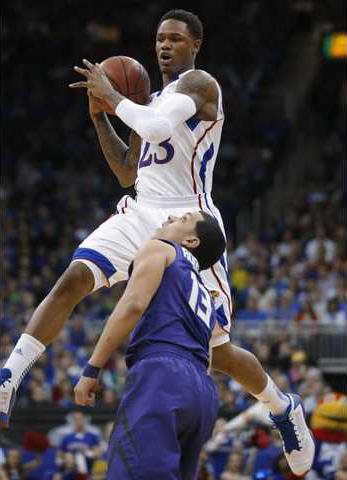LAWRENCE — Jeff Withey arrived at Kansas with a volleyball player’s body, a lanky 7-foot frame that was developed over years of playing on the beaches of his native San Diego.
Ben McLemore arrived with a more prototypical basketball player’s body, one that he honed while playing on the summer AAU circuit and at Christian Life Center in Humble, Texas.
Two entirely different players from two entirely different backgrounds, both of whom point to Jayhawks strength coach Andrea Hudy and her high-tech weight room for helping them earn All-Big 12 honors this season and, more than likely, preparing them for a future in the NBA.
“Andrea gets a lot of credit, and deservedly so,” said Jayhawks coach Bill Self. “What she does with the guys isn’t just from a weight gain, or things like that. It’s from a confidence, a flexibility. It’s from a core strength. It’s from things you can’t see.”
The results are plain to see, though.
The Jayhawks went 29-5 this season, won a share of their unprecedented ninth straight Big 12 title and earned the No. 1 seed in the South Region for the NCAA tournament. They open against Western Kentucky on Friday in Kansas City, Mo.
Hudy is a rarity in the world of big-time men’s college basketball, a female strength coach for a high-profile program. But even more rare is the success that she’s helped bring to the programs who have given her a chance: UConn and Kansas.
In more than nine years with the Huskies, where she worked with women’s coach Geno Auriemma and men’s coach Jim Calhoun, she helped deliver the school a combined seven national titles. Then, when Self was looking for a new strength coach, former athletic director Lew Perkins suggested he take a run at Hudy, even though Self was skeptical about hiring a woman to work with his team.
Hudy was hired in 2004, and has been a big reason why the Jayhawks have ripped off all those conference championships, and why they ultimately captured the 2008 national title. It surprised nobody at Kansas — and certainly not more than 30 athletes she’s helped reach the NBA or WNBA — when she was honored as the nation’s best strength coach last year.
She isn’t content to stand pat, either, and that’s where her technology-driven weight room comes into play. Hudy eschews the run-of-the-mill exercises that teams have been using for years for modern sports science.
In the past year, she’s brought on two new systems: SPARTA Scan with Kistler Force Plates, which tests ground reaction forces from a series of vertical jumps, and EliteForm, a processing unit that allows Hudy to track the speed of barbell lifts during weight-lifting sessions.
“Those are two specific things that set us apart from most programs,” Hudy said, “because nobody has the Force Plate software and there are only five other schools with the EliteForm.”
Once a week, Hudy brings in each player on the team and watches them do a series of jumps from a computer set up about 10 feet away. At a click of the mouse, the SPARTA program records all the data that they produce and feeds it into the company’s headquarters in Menlo Park, Calif.
The data is compiled sent back to Kansas’ system, where Hudy and her staff can track and compare the results of players throughout their career.
Ever wonder how McLemore, the Jayhawks’ star freshman, is able to seemingly leap right out of buildings to throw down those alley-oop dunks? That’s one of the reasons.
When Withey showed up, Hudy — who played four years of volleyball at Maryland — understood the limitations that presented. They were able to use the SPARTA system to create a series of workouts that strengthened his quad muscles and improved his ankle mobility, and the results have been staggering.
Gone is the gangly 7-footer, replaced by one of the nation’s premier post players.
“It’s made a difference in my play, and I feel quicker in my first step,” said Withey, the Big 12’s reigning defensive player of the year. “I’ve definitely seen a difference between this year and last year.”
After enduring eight knee surgeries, Hudy is also passionate about injury prevention. She is working closely with the school on a plan to test cortisol levels — better known as the ‘stress hormone’ — in athletes throughout a season. They’ll use the results to evaluate how cortisol may affect injuries.
“This has been years in the making, in terms of what we’re trying do and what we’re trying to compile,” Hudy said. “Cortisol could be a huge answer ... in what we’re seeing in terms of fatigue, and fatigue throughout the season.”
STRONG CORE
Kansas players credit strength coach, high-tech weight room for successes this season





